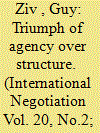|
|
|
Sort Order |
|
|
|
Items / Page
|
|
|
|
|
|
|
| Srl | Item |
| 1 |
ID:
139394


|
|
|
|
|
| Summary/Abstract |
This article advances the proposition that when the negotiator is empowered to reach an agreement on behalf of his or her government, agency has the potential to triumph over structure. The negotiator whose personal attributes include flexibility, sensitivity, inventiveness, tenacity and patience is more likely to meet this potential. Shimon Peres, the director-general of Israel’s Ministry of Defense in the mid-1950s, possessed many of these traits. He was also given virtually free rein by Prime Minister and Defense Minister David Ben-Gurion to pursue negotiations with France over the acquisition of a nuclear reactor. Despite significant structural hurdles – financial difficulties, domestic opposition, u.s. disapproval, and an unstable and divided French Fourth Republic – Peres’s unorthodox diplomacy allowed Israel to become a nuclear power. This case highlights the oft-overlooked role of agency in political science, in general, and in international negotiations, in particular.
|
|
|
|
|
|
|
|
|
|
|
|
|
|
|
|
| 2 |
ID:
167085


|
|
|
|
|
| Summary/Abstract |
As was evident from the intense reaction to Donald Trump’s comments during the 2016 presidential campaign about nuclear proliferation, many analysts believe that the United States has consistently given the goal of nonproliferation a top priority since the beginning of the nuclear age. That conviction, in turn, plays a major role in policy debates among experts in this area. In this article, I show that nonproliferation does not necessarily take precedence over other important US geopolitical interests through a close examination of American policy toward the Israeli nuclear program during the 1960s. Although nonproliferation goals certainly came into play, US officials repeatedly gave priority to other key objectives and, to a real extent, even believed that Israel’s nuclearization could hold certain strategic advantages. This finding, of course, has important theoretical implications for the basic question of whether international politics still works essentially as it did in the pre-nuclear era, as well as for policy debates over nuclear proliferation.
|
|
|
|
|
|
|
|
|
|
|
|
|
|
|
|
|
|
|
|
|